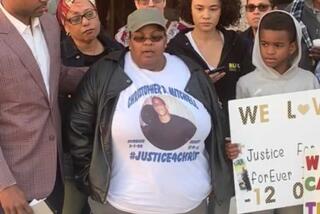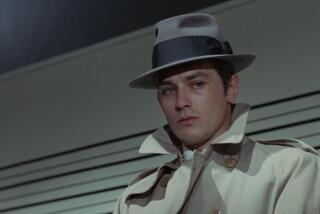Manslaughter Trial Ordered in Stabbing : Courts: Both defense and prosecution are upset by judge’s ruling in case of Solana Beach woman who killed her husband and buried him in the garden.
- Share via
A Solana Beach woman who repeatedly stabbed her husband in the back and chest was ordered Tuesday to stand trial--not for his murder, as the district attorney’s office had asked, but on the lesser charge of manslaughter.
Vista Municipal Judge Donald Rudloff said he didn’t believe Kimberly Delon had planned her husband’s murder because elements of the killing reflected “an almost juvenile thought process.”
Rudloff’s decision frustrated both sides in the case, and the prosecutor said she might still seek murder charges against Delon, 34, when she is arraigned Dec. 10 in Superior Court.
Rudloff said Delon didn’t show malice when she stabbed to death her husband of five years, thereby clearing her of murder. But the judge said a jury should decide whether the killing of Bernard Delon was manslaughter or self-defense, as her attorneys claim.
Now, instead of facing a possible conviction of first-degree murder--and its 25-years-to-life sentence--Delon faces possible conviction on a crime that carries at the most an 11-year prison sentence and, at the most lenient, release on probation.
The district attorney’s office had expressed confidence that there was plenty of reason to at least suspect, if not prove, that Delon murdered her husband. The woman dug his grave in their front yard and, that night, knelt over him in bed, straddled his legs and thrust the eight-inch blade of a kitchen knife into his back as he lay asleep, the prosecutor alleged.
Delon’s attorneys tried to show that the woman was confronted with an abusive and angry husband who was choking her dizzy, and that she flailed back with a knife, stabbing him in self-defense. In panic, she placed his body in a garden plot so her children wouldn’t see what happened, her attorneys said. The defense held out hope that the judge would simply dismiss the charges altogether, considering Delon a battered woman who righteously fought back.
Rudloff’s decision on what charge Delon should face before a jury came after he remarked--after both attorneys summarized their cases--that, if that jury were already to have heard them, it “would find reasonable doubt that there was either murder or manslaughter.”
But, he noted, benefit of the doubt in a preliminary hearing goes to the prosecution, just as benefit of the doubt at trial goes to the defendant.
During a break in the hearing, the prosecutor bristled at the judge’s comment that she failed to make a full case for conviction because, she said, she didn’t have to.
“It’s very, very unusual for a magistrate to comment and speculate (as to the depth of the prosecution’s case). Ask any prosecutor, ‘Do you try the whole case at the prelim?’ The answer is, no,” Deputy Dist. Atty. Ann Barber said. “It’s extremely unusual for him to speculate what the evidence will be at trial.”
And the unusual move by the preliminary hearing judge, to scale back the charges alleged by the district attorney’s office, frustrated both sides.
Defense attorney Charles Goldberg said that, in some respects, he would have preferred defending a woman accused of murder “because the more outrageous the prosecution theory is, the easier it is for me” to win acquittal.
Barber said her office might still file murder charges against Delon when she is arraigned Dec. 10 in Superior Court.
Delon was accused by the district attorney’s office of murdering her husband, Bernard, 33, on Aug. 31 and then burying his body in a vegetable garden alongside the driveway leading to their home.
Delon said she stabbed her husband after he attacked her in their bed. She said he was angry that she had embarrassed him in front of his mother the day before, and that the killing was the culmination of three successive nights of verbal and physical abuse directed at her by her husband, a waiter at a Del Mar restaurant.
Barber argued that Delon was seen by a neighbor toiling over the grave site the day of the killing, that she tried to hide the evidence of the stabbings, buried his body, manufactured lies to try to cover it up and only later told police what had happened.
Goldberg countered that the district attorney’s office presented “a wild scenario that is not supported by one piece of evidence,” and he challenged the judge to outright drop the charges so as not to burden the courts with the case.
“There’s a great deal of evidence of an attack on Ms. Delon, and she defended herself, and not one piece of evidence that she attacked Mr. Delon in his sleep,” Goldberg argued.
Rudloff said he didn’t think Delon, a former UCLA dance student and ballerina who met her French-born husband while on a dance tour through South Africa, had malice aforethought--a necessary ingredient to a murder charge--when she struck out at him.
As Rudloff recited the facts of the case, he made it clear that he believed Delon’s story that she was abused by her husband of five years. Among the critical issues for a jury to decide, he said, are the degree of that abuse and whether, legally, Delon had a right to strike back in self-defense because her life was truly in danger, or whether she perceived the danger to be worse than it really was.
Considering the marks on her body reflecting two nights of violence, Rudloff said, “I would characterize (the injuries) to be minimal at best, a relatively standard spousal abuse case that would be treated as a misdemeanor. There was no evidence of broken bones or violent bludgeoning. The choking was substantial, but it is relative.”
He said he found weaknesses in both sides of the story.
He chided Delon, for instance, for her attempts to bury her husband in the makeshift garden-turned-grave, saying that, if that was her notion of hiding a body, “she couldn’t pass the qualifying test to be a Mafia hit man.”
And he wondered aloud why Delon would keep a knife under the bed, questioning what good it would do to ward off burglars, as Kimberly Delon had said was the intent.
The entire killing scenario, he observed “was inconsistent with rational thinking.”
Rudloff said, “The court has to draw the line between the crime of murder with malice aforethought and that of manslaughter . . . in the heat of passion.”
“The court concludes there appears to be a total absence of malice. The circumstances that triggered the killing were initiated by the argument between the two.”
But, he added, “the defendant’s perception of the immediacy” of life-threatening danger “was inappropriate and irrational. . . . The killing was not supported by adequate provocation; it was motivated by unrealistic fear.”
Barber said afterward that she was “very disappointed” by Rudloff’s decision.
Goldberg said, “The judge is a very well-respected (former) prosecutor who handled the toughest of cases in the D.A.’s office for years, and I’d like to think he was sending a message to the D.A.’s office that they’ve got a turkey on their hands.”
More to Read
Sign up for Essential California
The most important California stories and recommendations in your inbox every morning.
You may occasionally receive promotional content from the Los Angeles Times.









